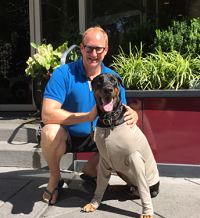 Last year, veterinary student Ben Lewis teamed up with his wife to found The One Health Company, a Philadelphia-based contract research organization (CRO) that he believes is unlike any of its competitors. That's because rather than using lab rats and other animals that pharma companies typically employ for preclinical studies, One Health recruits pet dogs for trials of experimental treatments being developed for people.
Last year, veterinary student Ben Lewis teamed up with his wife to found The One Health Company, a Philadelphia-based contract research organization (CRO) that he believes is unlike any of its competitors. That's because rather than using lab rats and other animals that pharma companies typically employ for preclinical studies, One Health recruits pet dogs for trials of experimental treatments being developed for people.
Lewis, who earned an MBA from the University of Pennsylvania's Wharton School and is now completing his veterinary degree at Penn, always dreamed of working in aquatic veterinary medicine. But instead he started One Health because he wanted to help solve a problem in pharmaceutical development: Millions of lab animals are used every year to test drugs that often end up not working very well in people.
At the same time, there are many human diseases that pet dogs are also vulnerable to, including heart failure, diabetes and several types of cancer. Designing clinical trials for those pets provides pharma companies with more realistic models, while also increasing the chances of new therapies coming to market that will help both dogs and people, Lewis says. So far, One Health has 450,000 pets in its database, and it reaches out to owners whenever a trial comes up that might be a good match.
I had the opportunity to sit down with Lewis recently in New York City to chat about his startup and the importance of enlisting pets in clinical trials. Here are some excerpts from our conversation.
 |
| Ben Lewis, One Health chief operating officer |
FierceAnimalHealth: What is the revenue model for the company?
Ben Lewis: Study sponsors such as biotech, pharma and device companies pay us to conduct their [animal] trials. Then we do the trial design, we do site selection set-up and we help with recruitment. We have biostatistics and bioinformatics experts, as well as medical writers. We manage the data with our own data-management system. So we function like a regular CRO.
FAH: Some pharma companies are already going straight to academic veterinary centers to run trials in pets. What do you offer beyond that?
BL: It's worked really well at the academic level, but one site might take a very long time to recruit pets for a clinical trial. Also they might not have the marketing arms or the business development experience to really go out and actively recruit pets for these trials. We think of ourselves as a real plug-and-play CRO that's a companion-animal natural disease model.
FAH: How is the veterinary community responding?
BL: Right now we have about 35 network partners that are our study sites. They include specialty animal hospitals, veterinary clinics and academic veterinary medical centers.
We pay for pets to receive care through clinical trials, and it turns out when you do that, a lot of veterinarians start asking how they can sign up. They send very heartfelt emails. We've had about 4,000 clinics approach us. So it's really been well-embraced by the veterinary community.
But it also adds to our growing pains. We have pretty rigorous screening and on-boarding process. A lot of the endpoints of our trials require sophisticated imaging--specialty equipment that might not be available in a general practice. Our site-inspection questionnaire is 18 pages. The detail we require is identical to when you're on-boarding a human clinical trial site. So we're really going to the next level here, I believe, but we only have 13 employees.
The response from the pharma community has also been positive. We're very busy with more studies than we can execute. We're operating on a backlog that we're trying to clear.
FAH: What is your funding status?
BL: Thus far the company has been self-funded. At this point we've put enough money into the company that we're ready to have some serious investors come in. We're in the process of closing a round of financing right now. That should propel us through the logjam, as well as increase our capacity. And we hope to continue building the team.
FAH: What are your expansion plans?
BL: We're expanding into cats, as well as horses. It turns out the ideal model for osteoarthritis is horses. When you look at the weight-bearing loads on the cartilage, the bone and the joints, horses approximate the people the best.
Cats are a good model of triple-negative [breast] carcinoma, as well as diabetes. And non-alcoholic steatohepatitis in people is very similar to feline hepatic lipidosis. Of the 450,000 pets in our database, the vast majority are dogs, but there are a fair number of cats.
We're looking to expand internationally. We have a partnership with a company doing something similar in Western Europe. We are in the process of on-boarding a very large academic veterinary medical center in Brazil.
I would love to be in 1,000 veterinary clinics by December, which is very ambitious. But hopefully the funding is there, hopefully the team is there. It's not an issue of supply or demand. It's an issue of maintaining quality control across so many sites.
-- Arlene Weintraub (email | Twitter)